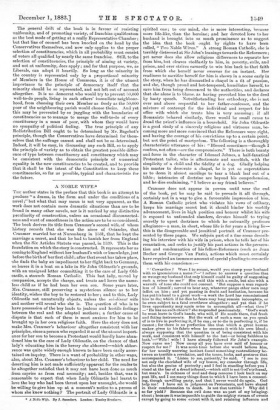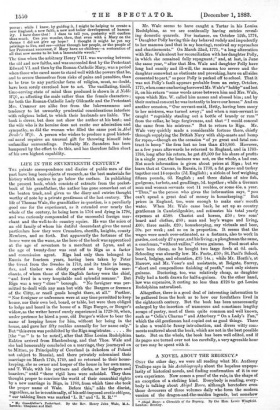A NOBLE WIFE.*
Tan author states in the preface that this book is an attempt to produce "a drama, in the form and under the conditions of a novel ;" but what that may mean is not very apparent, as the work does not contain more dramatic situations than are to be found in many other novels, nor is it marked by any distinctive peculiarity of construction, unless an occasional disconnected- ness and want of smoothness in the action are to be so considered. The book derives its title from Cranmer's second wife, of whom history records that she was the niece of Osiander, that Cranmer married her at Nuremburg in 1531, that he kept the marriage a secret, and that he had to banish her from England when the Six Articles Statute was passed, in 1539. This is the foundation on which the story is constructed. It represents her as coming to E ngland without her husband's wish or knowledge, just before the birth of her first child; after that event has taken place, -she finds the baby an impediment to her flight back to Germany, so leaves it in a boat on a lake in Sir John Oldcastle's grounds, with an unsigned letter committing it to the care of Lady Old- castle, a staunch Roman Catholic. This last lady, moved by compassion, accepts the charge, and treats and loves the name- less child as if he had been her own son. Some years later, Mrs. Cranmer, still preserving a mysterious silence as to her identity, wishes the boy to be restored to her; and to this, Lady Oldcastle not unnaturally objects, unless the soi.disant wife and mother will reveal who she is. The question of who is to have possession of the boy leads to jealous and hostile feelings between the real and the adopted mothers ; a farther cause of dispute is that each of them is most anxious for him to be brought up in her own religions faith. Here the story does not make Mrs. Cranmer's behaviour altogether consistent with her principles, since a person who regarded it as of the utmost import- ance for her son to become a Protestant would hardly have aban- doned him to the care of Lady Oldcastle, on the chance of that lady's educating him in the heresy she abhorred—which abhor- rence was quite widely enough known to have been easily ascer- tained on inquiry. There is a want of probability in other ways, also, about Mrs. Cranmer's behaviour to her child. The need for deserting him is not made sufficiently apparent for the reader to be altogether satisfied that it may not have been done as much _from caprice as from real necessity; and, besides that, was it reasonable to expect that when Lady Oldcastle had learnt to love the boy who had been thrust upon her unsought, she would be willing to give him up at a moment's notice to a person of whom she knew nothing? The portrait of Lady Oldcastle is a • A Noble Wife. By J. &under's. London : Tinsley Brothers.
spirited one ; to our mind, she is more interesting, because more life-like, than the heroine; and her devoted love to her husband is brought into so much prominence as to suggest
the idea that the book ought by rights to have been called, "Two Noble Wives." A strong Roman Catholic, she is terribly distressed at Sir John's leanings towards the Reformers ;
yet never does she allow religions differences to separate her from him, but cleaves stedfastly to him, in poverty, exile, and
prison, and ever strives earnestly to win him back to that faith from which she herself never swerves for an instant. Her
readiness to sacrifice herself for him is shown in a scene early in the story, when he has dismantled a chapel in a fit of passion, and she, though proud and hot-tempered, humiliates herself, to save him from being denounced to the authorities, and declares that she alone is to blame, as having provoked him to the deed by hasty speech. Notwithstanding her orthodoxy, she is not over and above respectful to her father-confessor, and the mixture of contempt for the individual and respect for his office with which she treats him is very amusing; if all Romanists behaved similarly, there would be small cause to dread the priest's influence in a household. Sir John Oldcastle is a good study of a sincerely religious and virtuous man, be- coming more and more convinced that the Reformers were right, and having the courage of his convictions up to a certain point, but not the point of martyrdom. The following is a thoroughly characteristic utterance of his : "Blessed sometimes—though I confess, not often—are the compromisers." There is both beauty and force in the character of Ishmael Johnes, a half-fanatical Protestant tailor, who is affectionate and unselfish, with the simplicity of a child and the fidelity of a dog. Gladly helping his master to desecrate a chapel, he is yet so superstitious as to deem it almost sacrilege to tear a blank leaf out of a bible ; intricacies of doctrine are beyond his comprehension, and he dies exclaiming, "I believe as my friend believes."
Cranmer does not appear in person until near the end of the book, yet he may be said to pervade it all through, certainly not in a way to give a favourable impression of him. A Roman Catholic priest who violates his vows of celibacy, keeps his marriage secret lest it should hinder his worldly advancement, lives in high position and honour whilst his wife
is exposed to unfounded slanders, devotes himself to trying secretly to upset doctrines to which he outwardly professes allegiance—a man, in short, whose life is for years a living lie—
this is the disagreeable and jesuitical portrait of Cranmer pre- sented by these pages. We subjoin part of a fine scene describ- ing his interview with his wife in prison, when he tells her of his recantation, and seeks to justify his past actions in the persecu- tion and condemnation of his fellow-Reformers (such as Joan Bocher and George Van Paris), actions which must certainly have required an immense amount of special pleading to reconcile them with his conscience :—
" Cowardice ? Were I to recant, would you stamp your husband with so ignominious a name ?'—' I refuse to answer a question that so wrongs my husband that only himself could be guilty of suggesting such a crime to me ?' She said this with a smile, but also with a warmth of tone she could not conceal. But suppose a man regard- less of himself ; nerved to bear any, whatever pangs other men may inflict on him ; and yet pausing in doubt and hesitation, because he has put his hand to a great work—a work the Lord has commissioned him to do; which if he dies he fears may long remain incomplete, or be even subject to a fatal overthrow altogether ; and yet that if he lives opportunity may again arise to accomplish all—what then ?'
He has no such choice !' she responded passionately. 'God's work he must leave in God's hands, who will, if He needs them, find fresh and fitting instruments. But the work of each a man as you speak of is to live in perfecting it, if he can ; or to die in perfecting it, if he cannot ; for there is no perfection like that which a great human maker, gives to his fabric when he cements it with his own blood ; always supposing that the question is of being consistent with his work, and consistent with himself to the last—or being faithless to both.'—' Wife ! wife ! I have already followed Sir John's example. Now curse me ! Now unsay all you have over said of honour or respect for me !' It was some time before she would believe him, for her usually unerring instinct found something contradictory be- tween so terrible a revelation, and the tones, looks, and gestures that accompanied it. Listen to me, patiently,' he said. I see in you not only the cherished wife of my bosom, my consoler through life, but also the genius of posterity ; and I feel in standing before you I stand at the bar of a dread tribunal,—which still is not God's tribunal, but man's. In sickness of soul and deep remorse I look back on my past life, and I see many things done to which I have been a consent- ing, though unwilling party, and that I never would do again. God help me ! I have sat in judgment on Protestants, and have shared in their condemnation to death. Is not that terrible ? Why did I so far yield ? Because the evil done was no part of my bringing- about ; because it was impossible to guide the mighty stream of events except by going to some extent with it, and retaining influence and power ; while I knew, by guiding it, I might be helping to create a new England, a new faith, a new and holier development of human- ity. I have done that! I dare to tell you, posterity will confirm thus much. Can you wonder, then, that even with a Mary on the throne I did not give up hope? I thought it might be yet my privilege to live, and see—either through her people, or the people of her Protestant successor, if Mary have no children—a restoration of all that now seems to be but a lamentable wreck."
The time when the arbitrary Henry VIII. was wavering between the old and new faiths, and was succeeded first by the Protestant Edward VI. and then by the Roman-Catholic Mary, was a period when those who cared more to stand well with the powers that be, and to secure themselves from risks of pains and penalties, than to be true to any particular form of religion, must, no doubt, have been sorely exercised how to act. The vacillating, timid,
time-serving state of mind thus produced is shown in A Noble Wife, as affecting the male rather than the female characters ;
for both the Roman-Catholic Lady Oldcastle and the Protestant Mrs. Cranmer are alike free from the lukewarmness and tendency to let unworthy prudential considerations interfere with religious belief, to which their husbands are liable. The
book is clever, but does not show the author at his best; and the wife who is its heroine does not excite our admiration and sympathy, as did the woman who filled the same post in Abel Drake's Wife. A person who wishes to produce a good histori- cal novel requires an unusual gift for throwing himself into unfamiliar surroundings. Probably Mr. Saunders has been hampered by the effort to do this, and has therefore fallen short of his own highest capability.







































 Previous page
Previous page